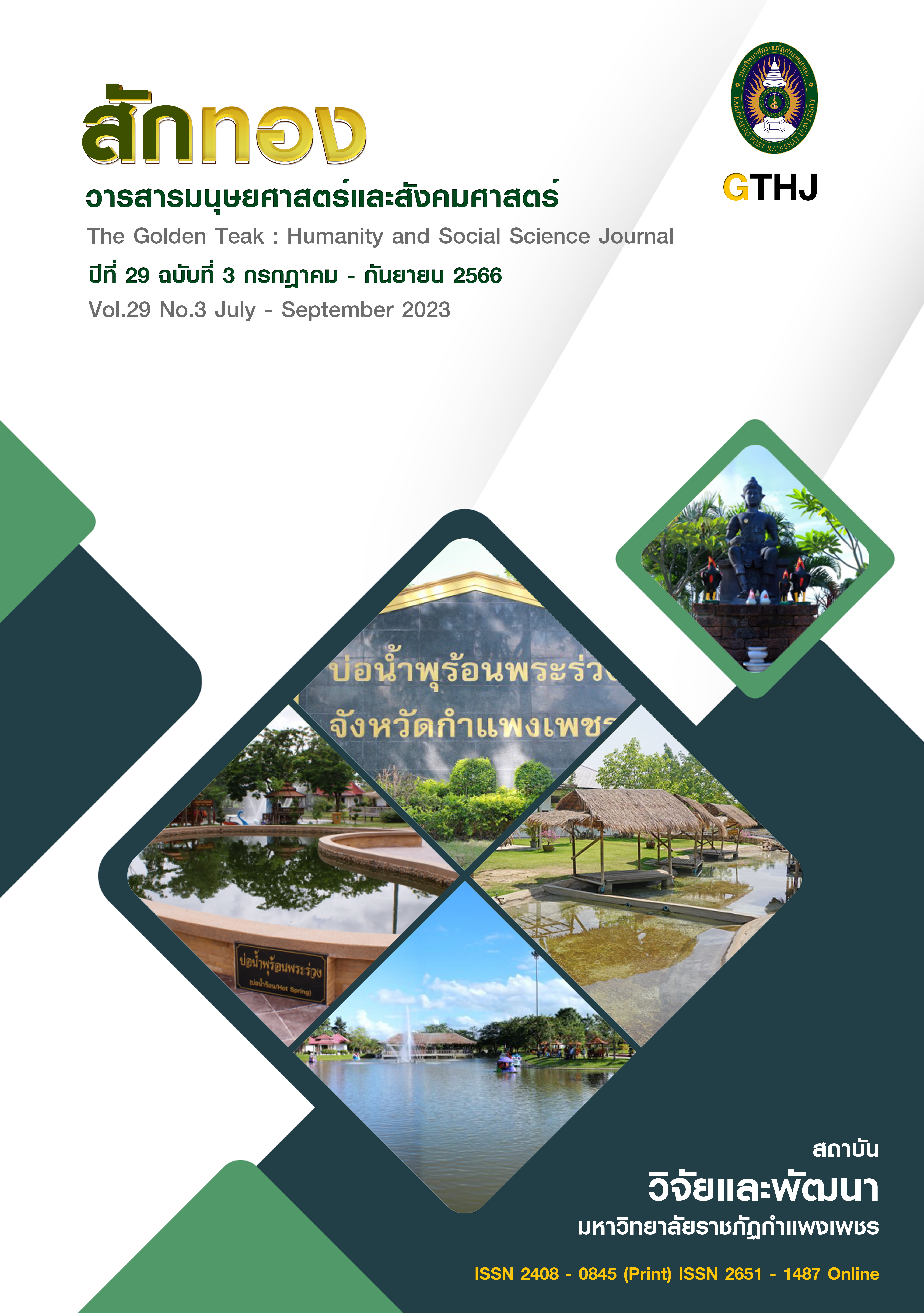The Development of Learning Activities Using Social Media in Combination with Brainstorming Techniques to Promote Media Literacy for First Year Undergraduates Sukhothai College of Dramatic Arts Bunditpatanasilpa Institute Students
Main Article Content
Abstract
The purposes of this research are 1) to create and find effective learning activities using social media in combination with brainstorming techniques and to promote media literacy for the 1st year undergraduates according to criteria 75/75 2) to try out learning activities using social media and brainstorming techniques to promote media literacy of the 1st year undergraduates. The research was conducted in 2 steps which were; Step 1: Making and finding effectiveness of learning activities using social media in conjunction with brainstorming techniques to promote media literacy for the 1st year undergraduates. The researcher created a total of 6 learning activities and presented to 5 experts to consider the appropriateness of the various elements of the activity by bringing all activities to efficiency with the 1st year undergraduates, semester 2, academic year 2020, Suphanburi College of Dramatic Arts, Bunditpatanasilpa Institute, Ministry of Culture. There were 3 experts to verify the suitability of language and time. Then the trial was applied to 9 students of the 1st year undergraduates, semester 2, academic year 2020, Chiangmai College of Dramatic Arts, Bunditpatanasilpa Institute, Ministry of Culture, and to 35 students of the 1st year undergraduates, Semester 2, Academic Year 2020, Lopburi College of Dramatic Arts, Bunditpatanasilpa Institute, Ministry of Culture to find the effectiveness of activities according to the criteria 75/75. The tools used in step 1 was the learning activities of social media using together with brainstorming techniques to promote talent in media literacy for the 1st year undergraduates, in step 2 Activity Trial of sample groups which were 30 first-year undergraduates, Sukhothai College Dramatic Arts, Bunditpatanasilpa Institute, Semester 1, Academic Year 2021 obtained by selecting a specific purposive sampling. The research pattern was One Group Pretest-Posttest Design. The research tool was the measurement test for knowledge and media literacy. There also was the media literacy assessment analyzing the data ; finding the Mean, Standard deviation and Dependent t-test. The research results were found that 1) For learning activities by using social media in combination with brainstorming techniques could promote talent In media literacy of the 1st year undergraduates, there were six key processes as the following: step 1 was problem setting, step 2 was issue consideration, stage 3 was justification for support, step 4 was participating in online commentary, step 5 was summarizing solution and step 6 was storing knowledge online. Experts estimated that it was highly appropriate at ( = 4.24, S.D. = 0.55) and when being tested the effectiveness, it was at 80.17/78.10. 2) Media literacy after learning was significantly higher than before at the level of .05
Article Details

This work is licensed under a Creative Commons Attribution-NonCommercial-NoDerivatives 4.0 International License.
บทความที่ได้รับการตีพิมพ์เป็นลิขสิทธิ์ของวารสาร สักทอง : วารสารมนุษยศาสตร์และสังคมศาสตร์ สถาบันวิจัยและพัฒนา มหาวิทยาลับราชภัฏกำแพงเพชร
ข้อคิดเห็นใดๆ ที่ปรากฎในวารสารเป็นวรรณกรรมของผู้เขียนโดยเฉพาะ ซึ่งมหาวิทยาลัยราชภัฏกำแพงเพชรและบรรณาธิการไม่จำเป็นต้องเห็นด้วย
References
Atthaphut, P., Sittiwong, T. & Theeraputhon, D. (2017). Effects of Using Social Media in Conjunction with Proactive Learning in Designing and Producing Computer Graphics for Undergraduate Students. Naresuan University Journal of Education, 19(2), 145-154. [In Thai]
Bunditpatanasilpa Institute. (2019). Bachelor of Education Program (4-year program), revised edition 2019. Sukhothai : Sukhothai College of Dramatic Arts, Bunditpatanasilpa Institute. [In Thai]
Chaichom, S. (1989). Effects of Brainstorming Methods on Multidisciplinary Problem-Solving Thinking of Preschool Children. Master of Education Thesis Early Childhood Education Graduate School Srinakharinwirot University. [In Thai]
Charoensap, T. (2014). Learning Management by Professional Teachers. [Online]. Available :
https://e-learning.srru.ac.th/mod/resource/view.php?id=57670 [2020, March 25].
Dyer, W. & John, V. (1988). Counseling technique that work application to individual and Group counseling. Washington, DC : APGA Press.
Ministry of Digital Economy and Society. Report of the Survey Results of Internet Use in Thailand in 2019. Electronic documents. [Online]. Available : https://www.etda.or.th/content/thailand-internet-user-behavior-2019-press-release.html [2020, January 2]. [In Thai]
Ministry of Social Development and Human Security. (2018). Social Media and the Future of Thai Children and Youth. Electronic documents. [Online]. Available : https://tpso1.m-society.go.th/index.php/en/tpso-news/2017-05-16-15-16-07/17-11111 [2019, December 25]. [In Thai]
National Statistical Office. (2018). Summary of the Use of Information and Communication Technology in the Household 2018 (1st quarter). Bangkok : National Statistical Office, Ministry of Digital Economy and Society. [In Thai]
Ngoksilp, J. (2010). Education 1. Chaiyaphum : Chaiyaphum. [In Thai]
Poore, M. (2013). Using Social Media in the Classroom. Singapore : SAGE Publications Asiapacific Pty Ltd.
Potter, W. James. (1998). Media Literacy. California : Sage.
Rasmeewiengchai, A. (2012). Media Literacy of Secondary School Students in Prachatipat Wittayakarn Community School. Bangkok : Research Project, Thammasat University. [In Thai]
Ruangsuwan, C. (2010). Design and Development of Computer and Network Lessons. Mahasarakham : Mahasarakham University. [In Thai]
Saiyot, L. & Saiyot, A. (1995) Educational Research Techniques. (5 th ed.). Bangkok : Suri Wiyasan. [In Thai]
Setkumbong, T. (2012). Results of E-learning with Collaborative Learning through Social Media on the Ability to Use Information and Communication Technology of Undergraduate Students, Department of Education/Education Science. Silpakorn University Journal, Thai version, Social Sciences and Arts, 5(2), 569-584. [In Thai]
Songkhram, N. (2011). Multimedia Design and Development for Learning. (2 nd ed.). Bangkok : Chulalongkorn University Press. [In Thai]
Srihiran, W. (2009). Knowledge Literacy of Newspapers of the People in Bangkok. Bangkok : Siam University. [In Thai]
Srisaat, B. (2002). Preliminary Research. Bangkok : Suwiriyasan. [In Thai]
Topothai, W. (2013). Development of Learners Using a Training Package : Title Online Media Literacy. [Online]. Available : http://www.stou.ac.th/eknowledge/Upload/2013/17 [2019, December 13].
UNESCO. (1982). Bulletin of the Unesco Regional office for Education in Asia and The Pacific (Special Issue). Bangkok : Unesco. [In Thai]
Wagner, R. (2011). Social Media Tools for Teaching and Learning. Athletic Training Education Journal, 6(1), 51-52.
Wongprathet, S. (2014). Results of Teaching and Learning Management Using Social Media According to the Theory of Social Media. Self-Knowledge on Creating Presentations for Mattaytom 1 Students. Master of Education Program Thesis Ramkhamhaeng University. [In Thai]


